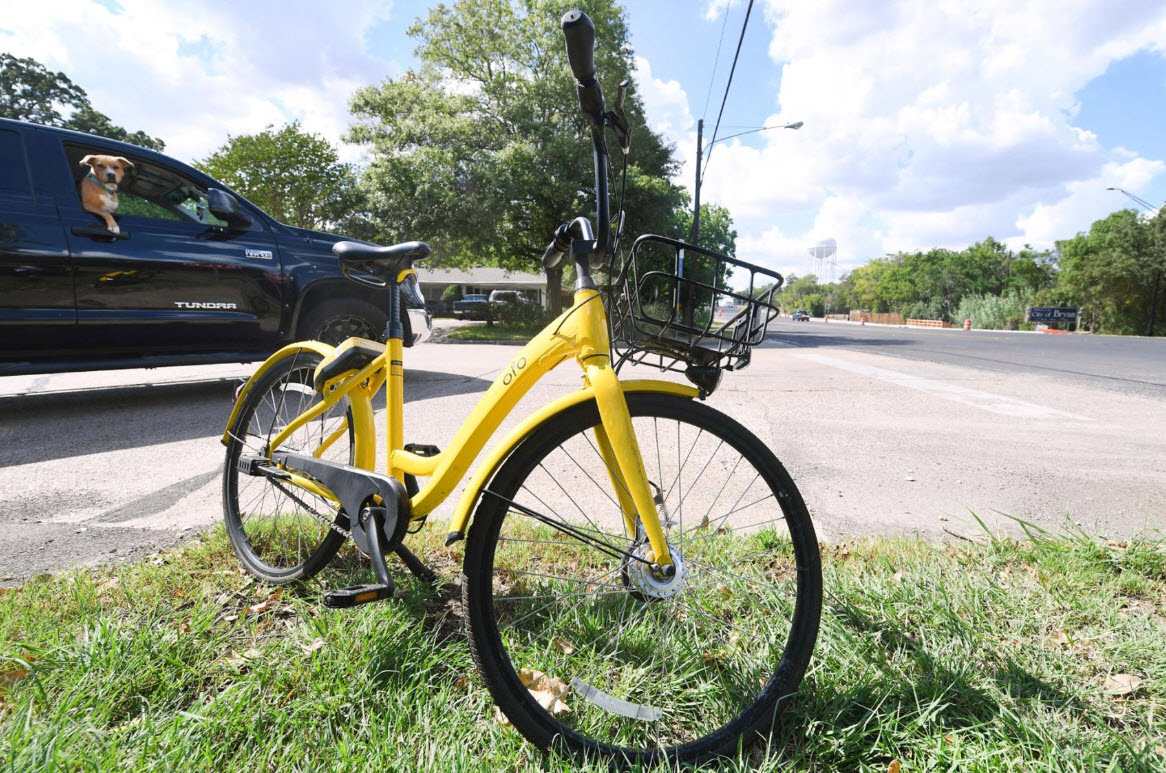College Station council: Only one Ofo citation issued under new bike-share rules
The Eagle
By Caitlyn Clark
Published: September 2, 2018

The city says only one citation has been issued so far under its new bike-share ordinance since it went into effect in mid-August. (Photo by Laura McKenzie)
So far only one citation has resulted from the city of College Station's dockless bike-share ordinance that was adopted in mid-July.
The regulations OK'd by the City Council were approved ahead of the fall semester at Texas A&M University, where the number of yellow Ofo bikes are expected to increase.
The ordinance, which outlines a set of rules bike-share companies must follow to operate in the city, was approved in July and went into effect in mid-August, but the city
has allowed a grace period while Ofo registered with the city.
Aubrey Nettles, special projects coordinator, said Ofo has had its permit for about a week, and since then only one citation has been issued.
Per the city's ordinance, bike-share companies must pay a $750 application fee to the city and deposit $5,000 into an escrow account. The operator must
remove bikes that are reported as being parked improperly or left outside of the program's geo-fenced area within two hours between 6 a.m. and 6 p.m.
At other times, bikes must be moved within two hours. If bikes aren't moved within those time periods, the city can charge a $125 relocation fee or issue
citations for violations with a fine of up to $500.
Bike-share companies that operate in College Station also must provide a way for users to report a safety or maintenance issue with a bike.
Nettles said the city has received complaints through its SeeClickFix platform, but Ofo so far has been responsive.
Ron Steedly, Texas A&M's Sustainable Transportation manager, said use of Ofo has seen an uptick since students have returned to town.
During Howdy Week, about 8,000 rides were logged on the app each day. During the first week of school, that increased to around 10,000 rides a day. When the program launched at
Texas A&M in March there were roughly 75,000 rides, and in April, when users started to pay to use the service, there were 68,000 rides.
Steedly said the total number of rides from March through July was a little more than 200,000.
There are about 2,500 Ofo bikes now on campus, and that number has been expected to grow to at least 3,000. The program became somewhat well known when it first launched for
users' tendencies to leave the bikes in improper locations such as on sidewalks, in roadways and even in trees. Steedly said those instances still represent about a 2 to 3
percent error rate. Riders are docked points through the app when a bike is parked illegally, improperly parked or left outside the geo-fenced area.
The geo-fence originally included just the campus and some nearby apartment complexes, but the radius has since been expanded some to include more
housing around the university. The H-E-B on Texas Avenue is also now included. Steedly said retail locations within the geo-fence will be contacted
about potentially being designated as "home zones," which are locations where Ofo bikes are allowed to be parked or dropped off.
While the geo-fence only includes a small portion of the neighboring city of Bryan added when the geo-fence was expanded, several Bryan City Council members expressed during a
workshop meeting on Tuesday that they'd be interested in learning more about the bike-share program to determine whether it should also adopt an ordinance.
Steedly said he's been encouraged by the program's popularity, adding that he thinks Texas A&M has been the best campus for Ofo to prove that bike-sharing can work in the United States. /p>
"Will it work in a city like Dallas? Probably not," Steedly said. "But that doesn't mean that it's just not going to work here. There's absolutely a need in situations like ours."
Read the full article here.